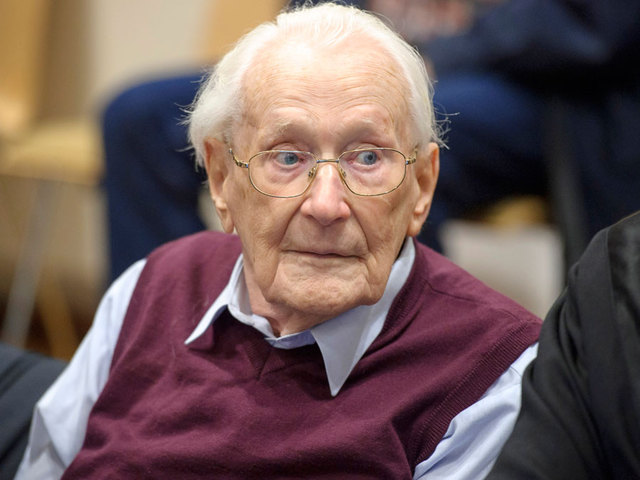Ex-Auschwitz guard convicted of 300000 counts of accessory to murder
Oskar Groening, defendant and former Nazi SS officer dubbed the “bookkeeper of Auschwitz”, listens to the verdict during his trial in Lueneburg, Germany, July 15, 2015.
Oskar Groening, a 94-year old German man and former SS guard, has been sentenced to four years in prison for his role in the murder of 300,000 people at the death camp, in what could perhaps be described as one of the last Holocaust trials to take place.
Groening volunteered in 1942 to join the elite Waffen-SS before being dispatched to the death camp, where he counted the money found among their belongings and sent it to SS headquarters in Berlin.
The four-year sentence, determined by the judge, exceeded the prosecution’s request for Gröning to be sentenced to three-and-a-half years, leaving many surprised at the verdict. Yet it was only in 2011 that legal authorities in Germany began to prosecute the “cogs in the machine” – the lower level Nazi functionaries – who collectively contributed to the death of six million Jews during the Holocaust.
The charges against him related to the period between May and July 1944 when 137 trains carrying roughly 425,000 Jews from Hungary arrived in Auschwitz. After being asked to leave all their luggage behind, the Jews were put through a selection process that sent majority directly to the gas chambers.
“I saw the gas chambers”.
At the start of the trial, he conceded he was “morally guilty”, but said “whether I am guilty under criminal law, you will have to decide”.
His lawyer later said Groening felt he could “only ask” God for forgiveness because the crimes committed at Auschwitz were “on such a scale that he can’t expect either the victims or their relatives to even think about the question of forgiveness”. “I was so shaken,” Groening recalled, later asking his commander for a transfer from Auschwitz. The survivors “are just happy that this trial has been carried through to the end and that there was a verdict”.
Several Holocaust survivors, including Susan Pollock and Ivor Perl, who were both taken to the camp as children, testified against him.
He said Groening had willingly taken a “safe desk job in a machinery designed entirely for the killing of humans” – a system that was “inhumane and all but unbearable for the human psyche”.
In past years, prosecutors in Frankfurt decided not to pursue the case against Groening and other concentration camp workers, saying there was no causal link between their actions and the killings that occurred around them.
He died at a German care home in 2012.
He noted that of 6,500 people who worked at Auschwitz known to authorities, only 49 were ever convicted after the war.











